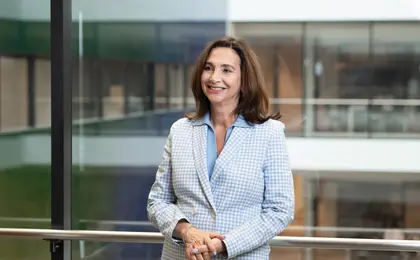
Tito Vidaurri ’90 M.A., ’91
MBA
By Dana Cook Grossman
Don’t ever tell Tito Vidaurri ’90 M.A., ’91 that something isn’t doable.
His father got only as far as third grade and his mother to sixth grade, but he holds three master’s degrees—one from the Centro de Investigación y Docencia Económicas (CIDE) in Mexico City, the other two from Yale.
He grew up in a country “where senior people are very difficult to approach,” but in New Haven he talked his way into a joint degree program that didn’t yet exist.
And he “came from a culture where you were on your own” but quickly absorbed the teamwork ethos of Yale SOM. He’s applied it ever since in his career back in Mexico, first in banking and now in energy. Despite all that he’s achieved, Vidaurri, the Mexico country head for EIG Global Energy Partners, remains self-effacing and eager to continue learning.
After earning bachelor’s and master’s degrees in economics in Mexico, he worked in the government for five years. “There is a tradition in the Mexican government to train people at global universities in economics,” he explains. “So I applied and got accepted to the master’s program at the Yale Graduate School of Arts and Sciences.”
“However,” he says, “when I got to New Haven I learned about SOM’s MPPM program—the master’s in public and private management, the name the MBA had at that time. Its mission of applying management tools to organizations across all sectors appealed to me very much.”
At first, Vidaurri modified his economics program with a few SOM courses. “I was a little bit brave,” he says. “I had to get approvals from the teachers at SOM and also from the teachers in economics.” But soon he decided what he really wanted was degrees from both schools. “The formal joint degree happened afterwards,” he explains. “My experience was an example the school used to validate it.”
He recalls being amazed at the access he had to faculty.
“I was knocking at many doors, and to my surprise I was able to get the doors open and be heard. I still remember talking to a very renowned professor of finance, Stephen Ross, who recently died. I was able to talk to him whenever I wanted to. I couldn’t believe it. It was a feature of the SOM culture that was very special to me.”
He also was attracted to the diversity of the student body. “I’m not talking only about racial diversity or socioeconomic diversity or women and men,” he says, “but also in terms of backgrounds. I was a government person, but there were people from the military, investment banking, consulting, and many other sectors. That makes the spirit at SOM much richer, because students are learning not only from teachers, but also from other students.”
The focus on teamwork was at first a challenge for Vidaurri. “It sometimes doesn’t come naturally,” he admits. “You have to invest in the relationship, you have to listen, you have to take a different point of view. But it’s very effective. You as an individual can be much more effective if you are a good team player. That was the number one cultural shock that I got—and embraced.”
He embraced a shift in his career path, too. “I wasn’t sure I wanted to go back to the government,” he says, “but I still wanted to do something for my country.” Thanks to a Yale SOM lottery for allocating summer internship interviews, even though he was “not an obvious candidate for investment banking,” Vidaurri landed a spot with First Boston (since acquired by Credit Suisse). The summer stint led to a permanent position and a 23-year run in Mexican banking, including with Deutsche Bank and Morgan Stanley.
But four years ago, he says, “I decided to do something different. There was a change in Mexican regulations that allowed for private investment in the energy sector. It was a perfect opportunity to get into something new, where my learning curve will continue to be steep and where I can continue to make a significant contribution to Mexico.”
Today, he oversees Mexican investment and capital development for EIG, which has $28 billion invested in 36 countries. “We finance projects across the value chain of the energy sector,” he explains. “It’s a huge part of the economy, but something only the public sector used to do in Mexico, so it’s a very exciting situation.”
And he contributes not just to his country, but also to his alma mater. Thirty years after he arrived in New Haven, Vidaurri co-chairs SOM’s Mexico Advisory Board and serves on the school’s Board of Advisors. “I am a creation of Yale SOM,” he says. “I don’t have unlimited resources, but whenever I can I give back money and time.”





